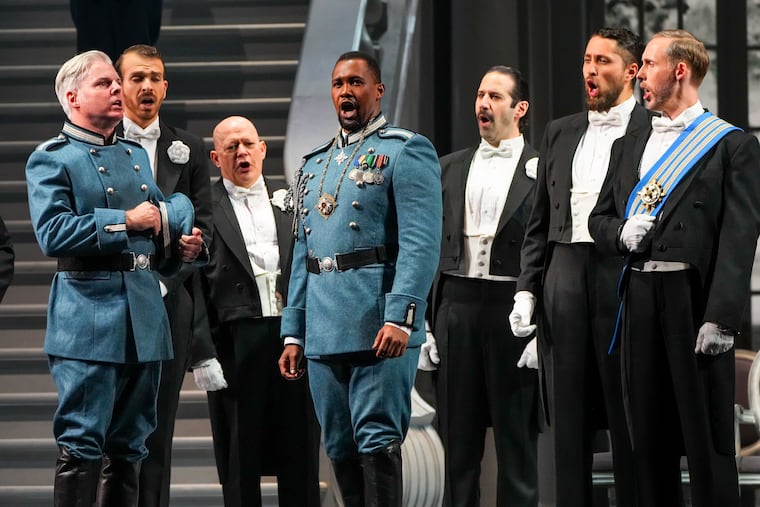Rossini’s ‘Otello’ at Opera Philadelphia: Vocal Olympics with a plot. And much plotting
Certainly, it’s epic — three spirited hours, though best heard by those who already know the playing field of this 200-year-old piece that doesn’t always reach across the centuries.

Time and again, encounters with Rossini’s Otello prompt the question: Is everybody in this opera a tenor? Except Desdemona?
That was a legit question in my only previous live encounter with this rarely done piece (2017 at Loft Opera in Brooklyn), but less so at the Opera Philadelphia performance Sunday afternoon at the Academy of Music. All three of the main tenors — Khanyiso Gwenxane as Otello, Lawrence Brownlee as Rodrigo, and Alek Shrader as Iago — were individualistic, well-chiseled voices in this classic tale of a great military general destroyed by newlywed jealousy. No voice felt redundant.
As the centerpiece of Opera Philadelphia’s Festival O22, the Emilio Sagi production imported from Opéra Royal de Wallonie in Belgium offered a chance to hear Rossini’s alternative to the more famous Verdi Otello in a handsome black-white-and-gray production updated to the 1920s with a generally capable cast. With music director Corrado Rovaris showing orchestra and chorus in excellent form, you had a clear sense of what the opera is and is not.
Certainly, it’s epic — three spirited hours, though best heard by those who already know the playing field of this 200-year-old piece that doesn’t always reach across the centuries. The composer knocked out 34 operas in 13 years during the period when Otello was written. Though the first two acts are standard, above-average Rossini, words say one thing, and the music expresses something else at times. This was a period of dramaturgy when storytelling was sometimes secondary to Olympic-level singing opportunities. But Act III — Otello’s murder of Desdemona — departs from standard operatic formulas in a chilling portrait of obsession that takes on mercy-defying momentum. The murder became inevitable.
» READ MORE: Most operas are lucky to have one star tenor. Opera Philadelphia’s ‘Otello’ has three.
This act is the main reason to revive the piece, and that’s what the Opera Philadelphia casting seemed directed toward. The first two acts require such florid vocal display; soprano Beverly Sills once described this genre of opera as having notes so high even a dog can’t hear them. As good as they were in Act III, South African tenor Gwenxane, in his U.S. debut, and mezzo-soprano Daniela Mack, as Desdemona, missed intricate details that can be so thrilling earlier in the opera, and even the broad strokes were at times unruly.
Only Brownlee (a Rossini specialist) conveyed the astounding vocal athleticism that this music was written for, and did so with a sense of what it could all mean dramatically. Shrader’s Iago went even further in that respect. The fact that some listeners hissed him during his curtain call was a compliment to how compellingly evil he was. The ensemble passages among the tenors were also a treat; their voices were so different they had to reach to find common vocal ground. With that came welcome dramatic tension. Bass-baritone Christian Pursell as Desdemona’s father also didn’t get off easy, and like Gwenxane, seemed seriously promising but a bit vocally unfinished.
Footnote: Rossini actually wrote an alternate happy ending to this opera, where everyone lives. It’s actually worth hearing, surprisingly enough.
Otello is repeated Sept. 30 and Oct. 2 at the Academy of Music. Tickets: $25-$299. Information: www.operphila.org, 215-732-8400.